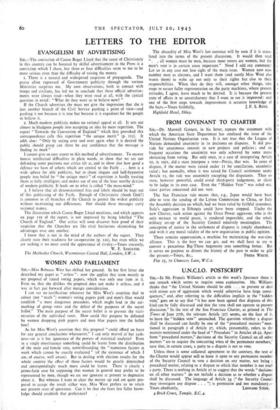U.N. C.I.O. POSTSCRIPT Sig,—In Mr. Francis Williams's article in this
week's Spectator there is one remark which seems to require some explanation. Mr. Williams thinks that " the United. Nations should be able . . . to prevent or deal with minor acts of aggression which would otherwise have large conse- quences," and, after referring to the difficulties implicit in the " hidden veto," goes on to say that " it has now been agreed that disputes of this kind can be fully discussed and that the veto shall not operate to prevent discussion." In the text of the San Francisco Charter, as printed in The Times of June 27th, the relevant Article (27) seems, on the face of it, to leave the "hidden veto" untouched. The question whether a dispute shall be discussed can hardly be one of the " procedural matters " men- tioned in paragraph 2 of Article 27, which, presumably,- refers to the matters mentioned under the head of "Procedure" in Articles 28-32. Apart from " procedural matters," decisions of the Security Council on all other matters " are to require the concurring votes of the permanent members," save that, in certain cases, a party to a dispute is not to vote.
Unless there is some collateral agreement to the contrary, the text of the Charter would appear still to leave it open to any permanent member of the Security Council to veto a decision on any matter, not being a procedural matter, relating to a dispute to which that member is not itself a party. There is nothing in Article 27 to suggest that the words " decisions on all other matters " do not include a decision as to whether a dispute shall be discussed. The language of Article 34 (" the Security Council may investigate any dispute . . . ") is permisshie and not mandatory.—


























 Previous page
Previous page